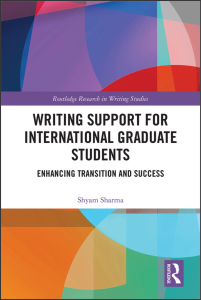 Recent book (Routledge)
Recent book (Routledge)
Using qualitative data collected from more than twenty universities across the US, Writing Support for International Graduate Students describes and theorizes agency- and advocacy-driven practices, programs, and policies that are most effective in helping international students learn graduate-level writing and communication skills. It uses compelling narratives and cases to illustrate a variety of program models and support practices that fostered the students’ process of academic transition and success. Employing an ecological framework, the book seeks to advance academic conversation about how writing scholars/instructors and program administrators, as well as other academic service professionals working with this student body, can formulate policies, develop programs, and implement practices that best help these students grow as writers and scholars in their disciplines.
I share a few notes about the book here.




